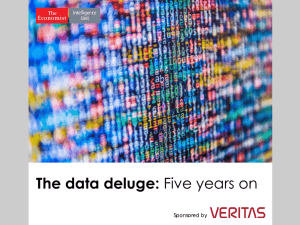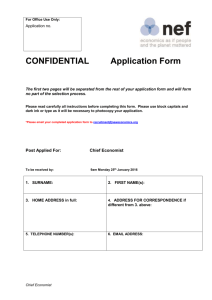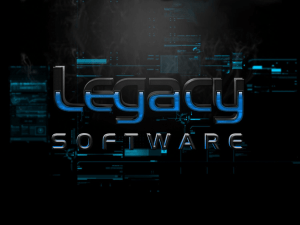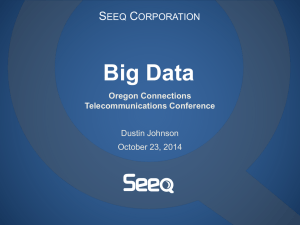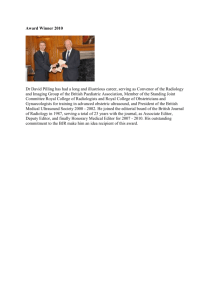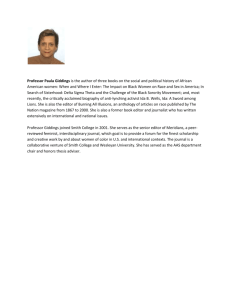full programme
advertisement
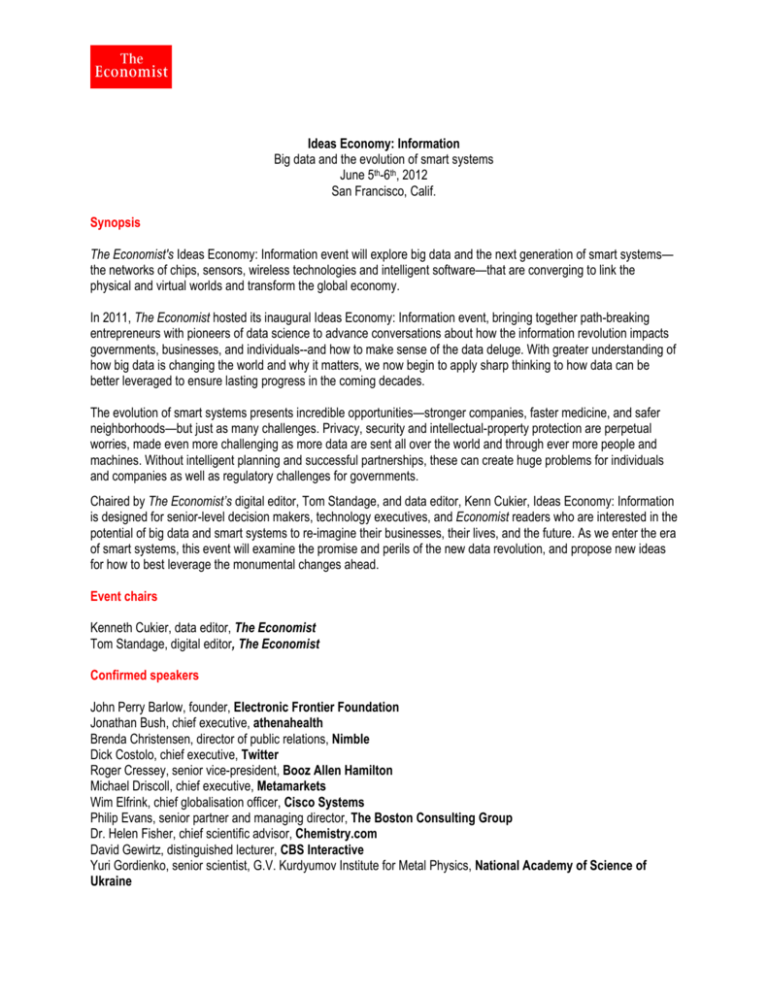
Ideas Economy: Information Big data and the evolution of smart systems June 5th-6th, 2012 San Francisco, Calif. Synopsis The Economist's Ideas Economy: Information event will explore big data and the next generation of smart systems— the networks of chips, sensors, wireless technologies and intelligent software—that are converging to link the physical and virtual worlds and transform the global economy. In 2011, The Economist hosted its inaugural Ideas Economy: Information event, bringing together path-breaking entrepreneurs with pioneers of data science to advance conversations about how the information revolution impacts governments, businesses, and individuals--and how to make sense of the data deluge. With greater understanding of how big data is changing the world and why it matters, we now begin to apply sharp thinking to how data can be better leveraged to ensure lasting progress in the coming decades. The evolution of smart systems presents incredible opportunities—stronger companies, faster medicine, and safer neighborhoods—but just as many challenges. Privacy, security and intellectual-property protection are perpetual worries, made even more challenging as more data are sent all over the world and through ever more people and machines. Without intelligent planning and successful partnerships, these can create huge problems for individuals and companies as well as regulatory challenges for governments. Chaired by The Economist’s digital editor, Tom Standage, and data editor, Kenn Cukier, Ideas Economy: Information is designed for senior-level decision makers, technology executives, and Economist readers who are interested in the potential of big data and smart systems to re-imagine their businesses, their lives, and the future. As we enter the era of smart systems, this event will examine the promise and perils of the new data revolution, and propose new ideas for how to best leverage the monumental changes ahead. Event chairs Kenneth Cukier, data editor, The Economist Tom Standage, digital editor, The Economist Confirmed speakers John Perry Barlow, founder, Electronic Frontier Foundation Jonathan Bush, chief executive, athenahealth Brenda Christensen, director of public relations, Nimble Dick Costolo, chief executive, Twitter Roger Cressey, senior vice-president, Booz Allen Hamilton Michael Driscoll, chief executive, Metamarkets Wim Elfrink, chief globalisation officer, Cisco Systems Philip Evans, senior partner and managing director, The Boston Consulting Group Dr. Helen Fisher, chief scientific advisor, Chemistry.com David Gewirtz, distinguished lecturer, CBS Interactive Yuri Gordienko, senior scientist, G.V. Kurdyumov Institute for Metal Physics, National Academy of Science of Ukraine Spencer Greenberg, chief executive, Rebellion Research Jeff Hammerbacher, chief scientist, Cloudera Jessica Jackley, chief executive, ProFounder Jeff Jonas, distinguished engineer, IBM Andrew Keen, author, “Cult of the Amateur” Vivek Kundra, executive vice-president for emerging markets, Salesforce Max Levchin, chairman, Kaggle Steve Lewis, chief executive, Living PlanIT Kevin Lynch, chief technology officer, Adobe Systems Mari Maeda, deputy director of the defense sciences office, DARPA Heidi Messer, co-founder, Collective[i] Geoffrey Nunberg, adjunct professor, school of information, University of California, Berkley Phil Owens, engineer, GFI Software DJ Patil, chief scientist in residence, Greylock Partners Juliette Powell, author, “33 Million People in the Room” Matt Quinn, chief technology officer, TIBCO Rick Smolan, chief executive, Against All Odds Production Astro Teller, director of new projects, Google Robert Rodriguez, chairman and managing principal, SINET Marc Rotenberg, executive director, Electronic Privacy Information Center Jordan Shlain, MD, founder, Healthloop Tiffany Shlain , director, “Connected: An Autoblogography About Love, Death, & Technology”; founder, The Webby Awards Hal Varian, chief economist, Google Geoffrey West, professor, Santa Fe Institute Richard Saul Wurman, creator, TED Programme Day one – Tuesday, June 5th 2012 1.00 pm Registration and refreshments 2.00 pm Welcome remarks The Economist perspective on information and big data Kenneth Cukier, data editor, The Economist Tom Standage, digital editor, The Economist 2.15 pm The new information architecture Data and the power to understand Richard Saul Wurman, creator, TED Interviewer: Kenneth Cukier, data editor, The Economist 2.30 pm The world of big data A series of interviews exploring the promise and perils of the data deluge Kenneth Cukier, data editor, The Economist Jeff Hammerbacher, chief scientist, Cloudera Geoffrey Nunberg, adjunct professor, school of information, University of California, Berkley Juliette Powell, author, “33 Million People in the Room” 3.30 pm Afternoon break Sponsored by TIBCO 4.00 pm Intelligent infrastructure A technologist looks at cities of tomorrow Steve Lewis, chief executive, Living PlanIT Interviewer: Tom Standage, digital editor, The Economist 4.15 pm The Economist-InnoCentive Smart Systems Challenge An interview with the winning solver and accompanying data visualisation Yuri Gordienko, senior scientist, G.V. Kurdyumov Institute for Metal Physics, National Academy of Science of Ukraine Interviewer: Tom Standage, digital editor, The Economist 4.30 pm App developers How data from the crowd can build intelligent cities Wim Elfrink, chief globalisation officer, Cisco Systems Vivek Kundra, executive vice-president for emerging markets, Salesforce Interviewer: Tom Standage, digital editor, The Economist 5.00 pm Urban friction A physicist looks at cities of tomorrow Geoffrey West, professor, Santa Fe Institute Interviewer: Kenn Cukier, data editor, The Economist 5.15 pm The human face of big data A visualisation Rick Smolan, chief executive, Against All Odds Production 5.30 pm Interviewer: Tom Standage, digital editor, The Economist The Economist debates… Proposition: This house believes that society benefits when we share information online. Defending the motion: John Perry Barlow, founder, Electronic Frontier Foundation Against the motion: Andrew Keen, author, “Cult of the Amateur” Interviewer: Tom Standage, digital editor, The Economist 6.00 pm Closing remarks Kenn Cukier, data editor, The Economist Featuring: Marc Rotenberg, executive director, Electronic Privacy Information Center 6.15 pm Cocktail reception Sponsored by Splunk 7.30 pm End of day one Day two – Wednesday, June 6th, 2012 8.00 am Registration 8.45 am Welcome remarks and recap of day one 9.00 am The network effect Three short talks about ways data can change the world Tiffany Shlain , director, “Connected: An Autoblogography About Love, Death, & Technology”; founder, The Webby Awards Jeff Jonas, distinguished engineer, IBM Mari Maeda, Deputy Director of the Defense Sciences Office, DARPA Moderator: Kenn Cukier, data editor, The Economist 9.45 am The new disruptors Big data and new business models Jonathan Bush, chief executive, athenahealth Kevin Lynch, chief technology officer, Adobe Systems Heidi Messer, Co-founder, Collective[i] 10.30 am Moderator: Kenn Cukier, data editor, The Economist Corporate chemistry A personality-driven networking break Introduction by Helen Fisher, chief scientific officer, Chemistry.com 11.15 am Big Data II: Lessons from the leaders An Economist Intelligence Unit research programme sponsored by SAS The nature of the firm The real value of big data Philip Evans, senior partner and managing director, The Boston Consulting Group Kenn Cukier, data editor, The Economist 11.45 am Corporate chemistry revealed How personality data can change the way you work Helen Fisher, chief scientific officer, Chemistry.com 12.00 pm Cybersecurity simulation An elite cyberthreat working group made up of industry experts and government officials is racing against time to mitigate the damage of a cyber attack. Written by David Gewirtz, distinguished lecturer, CBS Interactive 1.00 pm 2.30 pm Brenda Christensen, director of public relations, Nimble (as special assistant to the president and assistant press secretary) Roger Cressey, senior vice-president, Booz Allen Hamilton (as director of the White House Office of Cybersecurity) Phil Owens, engineer, GFI Software (as the anti-malware industry representative) Robert Rodriguez, chairman and managing principal, SINET (director, Office of White House Liason, US Department of Commerce) Lunch Sponsored by Itron Going social Twitter and the architecture of scale Dick Costolo, chief executive, Twitter 3.00 pm Interviewer: Tom Standage, digital editor, The Economist Community entrepreneurship Will crowdfunding save the economy? Jessica Jackley, chief executive, ProFounder Interviewer: Tom Standage, digital editor, The Economist 3.15 pm Nanoeconomics Trends in forecasting Hal Varian, chief economist, Google Moderator: Kenn Cukier, data editor, The Economist 3.30 pm Afternoon break Sponsored by OSIsoft 4.00 pm Smart medicine Can data fix health care? Jordan Shlain, MD, founder, Healthloop Interviewer: Kenn Cukier, data editor, The Economist 4.15 pm The quant's quant How big data is reinventing global finance Spencer Greenberg, chief executive, Rebellion Research Matt Quinn, chief technology officer, TIBCO Interviewer: Kenn Cukier, data editor, The Economist 4.45 pm The case for moonshots How big data promotes big thinking Astro Teller, director of new projects, Google Interviewer: Tom Standage, digital editor, The Economist 5.00 pm Beyond big data Signals on the horizon Michael Driscoll, chief executive, Metamarkets Max Levchin, chairman, Kaggle DJ Patil, chief scientist in residence, Greylock Partners Interviewer: Kenn Cukier, data editor, The Economist 5.45 pm Closing remarks and end of conference
